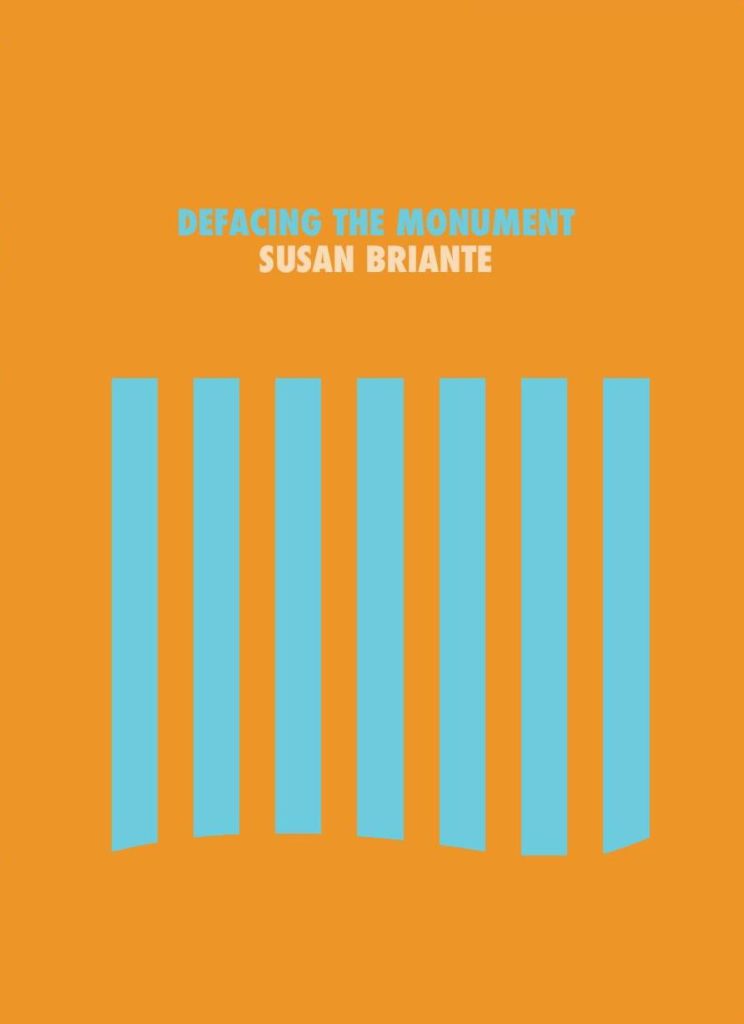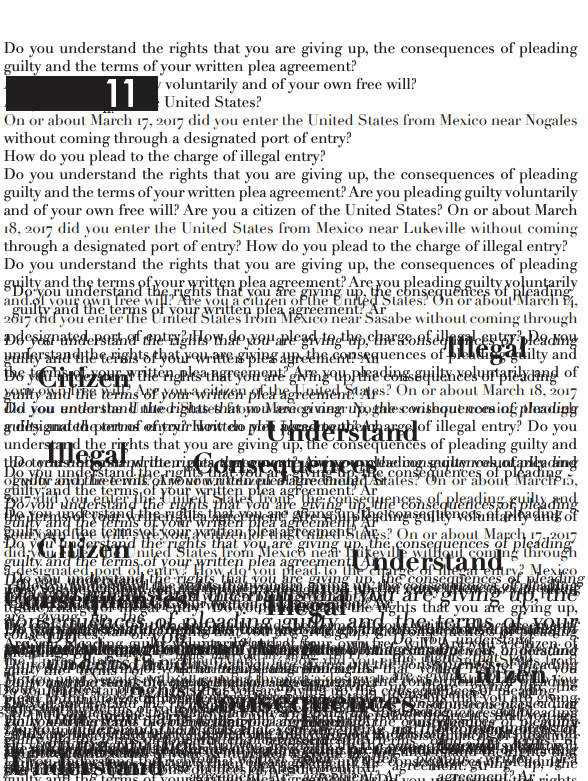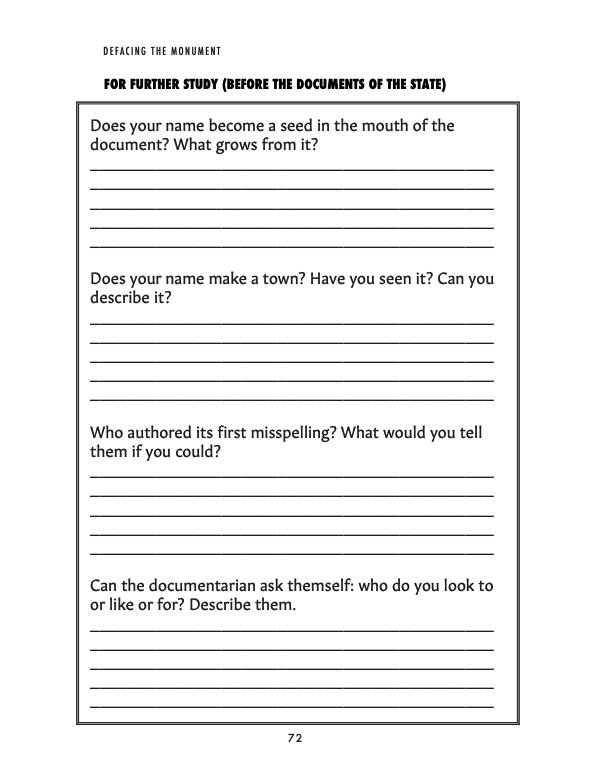Work to Be Done
By Lindsay Schubert | Contributing Writer

Defacing the Monument
Susan Briante
Noemi Press, 2020
Susan Briante’s Defacing the Monument is a documentary poetics project which at one level describes the manifold crises at the border between the United States and Mexico, calling attention to the systems of racism and discrimination present throughout US history. At another level, Briante calls the book’s own text into question, speaking directly to poets and documentarians, provoking reflection as to who should be telling the stories of those who experience oppression, and why. Briante is both bold and careful: painstakingly, attentively, sorrowfully filling the pages with both concern and self-interrogation. She describes and models a method that creatives can use to reflect on and challenge their own work: to go beyond simply documenting injustice in order to recognize, on the page, how writers and documentarians become complicit with structures and systems of violence.
Defacing the Monument is multimodal; three main sections of text and an epilogue are followed by a list of resources, questions, and exercises, including “QUESTIONS AND PROVOCATIONS FOR THE DOCUMENTARIAN.” These resources place the book in a position to instruct, emphasizing Briante’s experience as an educator. The text includes photos of detention centers, the border wall, government documents, maps, and Facebook posts—as well as images of work from other poets such as Layli Long Soldier and M. NourbeSe Philip. Both image and text integrate the voices and influence of other creatives, gathering a collective from which the book’s messages rise. The sections enact the thought process Briante follows as she writes: describing, enquiring, questioning her own position. At the same time, Briante pushes against organization and clear order. Often in the text, she explains her approach to an issue by asking a question: “In an archive, there should be an order, document follows document, but often we yearn to thwart chronology. / Why must our documents be coherent if order is what we want to / disrupt?” This desire to disrupt joins the themes of immigration, expanding the document of record, and questioning documentation from the point of view of power.
The text begins with Briante (who is white) sitting in a courtroom of the US District Court, Arizona District, observing the Operation Streamline hearings where “unauthorized migrants” are prosecuted en masse and sent to prison prior to deportation. The judge asks the same five questions over and over as each migrant is questioned. Migrants are rarely allowed to add more than three words to the record: “yes,” “no,” or “guilty.” Briante then includes a layered erasure designed by Suzi Garcia that folds the words of the judge until they become a blur:

Briante quotes Muriel Rukeyser: “Poetry can extend the document,” and here Suzi Garcia’s work extends the historical document of record by showing the detached, impersonal nature of the judge’s words. Briante then points to words that are missing from the record: “economic,” “family,” and “asylum.” Here she extends the document of the court record further by drawing attention to the way it dehumanizes migrants.
If documenting was all Defacing the Monument accomplished, the text would fail; if Briante only focused on her own compassion and alarm, her work would remain uncomplicated. Instead, Briante questions her position as a white writer of privilege and provokes her audience to do the same. She asks, “Poet, do you make poems out of the suffering of others without / considering how you are implicated in that suffering?” She observes, “I do not mean I get to imagine my way into [the stories of migrant women]. I mean my compassion must compel me to see the ways directly or indirectly that I am implicated in their suffering.” The text pushes the reader beyond feeling into an examination of how their work might perpetuate oppression by assimilating the voices of others, commodifying others’ stories, or transforming reality into nostalgia. Briante provides readers with poems-turned-worksheets to facilitate this reflection: form mirroring content. “FOR FURTHER STUDY (BEFORE THE DOCUMENTS OF THE STATE)” asks, “Does your name become a seed in the mouth of the document? What grows from it?” The blank lines that follow imply that there is indeed work to be done—and it challenges the reader to respond, to interact, to examine. Briante encourages readers to “tremble in the tangle of compassion, complicity, opacity, and relation” rather than rushing away from that discomfort.
Briante does not leave the reader lost in this tangle of questioning; instead, a teacher, she proposes a model for poetic construction within disorder. She urges poets to “speak the webs that exist and to speak new webs of connection into existence. To speak with the vulnerability of thread,” careful to “mark our silence before the stories that are not ours.” This assignment requires that writers “deface the documents to write back through them or into them, to fill in what’s been left out or suppressed . . . to speak some version of a truth.” Briante models this act of defacing the historical record in order to speak truth by including Suzi Garcia’s erasure of the judge’s words from the Operation Streamline hearings.
Defacing the Monument is disconcerting, disorganized, without resolution—and that’s the point. Briante challenges the readers in her audience with privilege similar to her own to observe, reflect, and document—and then go beyond documentation to struggle with (and understand) their own positions of privilege. She calls upon poets to stand witness, to make poems a “space to deface the monuments or reveal the brutality of [an official document] or the violence it represents.” Most of all, Defacing the Monument is a call for poets and other creatives to get to work. This work will begin when poets begin to challenge their own writing by questioning how they themselves may be implicated and complicit within structures of violence. As they do this, they will become better able to recognize when to speak and when to stay silent.

—
Lindsay Schubert is a Wisconsin-based writer and editor of poetry and picture books. She is a recent graduate of Central Washington University’s English: Professional and Creative Writing B.A. program, volunteers as a poetry reader for Chestnut Review, and is also a nurse. Twitter: @lindsaymaeve
Susan Briante’s most recent book The Market Wonders (Ahsahta Press) was a finalist for the National Poetry Series. The Kenyon Review calls it “masterful at every turn.” She is also the author of the poetry collections Pioneers in the Study of Motion and Utopia Minus (an Academy of American Poets Notable Book of 2011), both from Ahsahta Press. About Utopia Minus, Publisher’s Weekly declared: “this book finds an urgent language for the world in which we live.”
Briante writes creative nonfiction and essays on documentary poetics. Some of these can be found in Gulf Coast, Guernica, Black Warrior Review, Creative Nonfiction, Rethinking History, Jacket2 and The Believer. Her poems and essays been collected (or are forthcoming) in the anthologies Bodies Built for Game (The Prairie Schooner Anthology of Contemporary Sports Writing), The Poetry of Capital (Univ of Wisc.), Poems for Political Disaster (Boston Review), The Force of What’s Possible, The Volta Book of Poets, The Arcadia Project: the North American Postmodern Pastoral, Starting Today: Poems for Obama’s First 100 Days, The Sonnets: Rewriting Shakespeare, and An Introduction to the Prose Poem.
A translator, she lived in Mexico City from 1992-1997 working for the magazines Artes de México and Mandorla. Her translations have appeared in the journals Bomb, Bombay Gin, Translation Review and Review: Latin American Literature and Arts (among many others) as well as in the anthologies Reversible Monuments: Contemporary Mexican Poetry and Hotel Lautreamont: Contemporary Poetry of Uruguay.
Briante has received grants and awards from the Atlantic Monthly, the MacDowell Colony, the Academy of American Poets, the Dorothy Sargent Rosenberg Memorial Fund, the US-Mexico Fund for Culture, and (most recently) the Ucross Foundation.
Her research and teaching interests include poetry and poetics, creative nonfiction, cross-genre writing, experimental autobiography, documentary studies, affect theory, and translation. She is a professor of creative writing at the University of Arizona. She serves as the faculty liaison and educational facilitator for the Southwest Field Studies in Writing Program. The Southwest Field Studies in Writing program amplifies voices and expands dialogue on issues related to the border by sending three Creative Writing MFA students to research and write during a two-week residency in Patagonia, AZ, on projects unique to the borderlands.
Briante also produces and hosts the radio program Speedway and Swan, an hour of free-form poetry and music on KXCI 91.3 Tucson.
